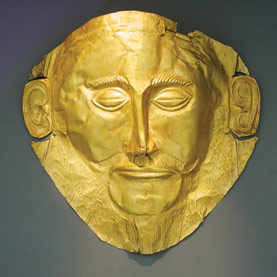
IRIS login | Reed College home Volume 90, No. 4: December 2011
Classic Lectures
Darkness, Light, and Drama in the Oresteia
Prof. Thomas Gillcrist explores Aeschylus's great trilogy.
By Thomas Gillcrist
This is the third of our classic Hum lectures, selected by Prof. Peter Steinberger [political science 1977–].

Th
The stage is dark at the beginning of the Agamemnon. In darkness the Watchman laments his discomfort and anxiety. When the beacon appears, it is the visual initiation of a motif that will recur throughout the trilogy, both verbally and visually: light out of darkness. This light is both real and a will o’ the wisp. It is the signal the watchman was set out to wait for, announcing Agamemnon’s victory and impending return. But it is not the “good news” that “shines through the darkness” the Watchman hoped for. The King’s return will not bring the restoration of order in the house and city, the “happy deliverance from toil” that the sentinel desires. By the time he descends from the roof, he knows it will not, and why. The Watchman is only the first of the play’s characters whose hopes for light out of darkness are quickly seen or feared or expected to be deluded, by themselves or us.
Th
The next appearance of the net motif is verbal again, but intensely visualized by the speaker and demanding an equally intense imaginative visualization from the audience. This is the Chorus’s conception of Agamemnon’s command regarding Iphigenia and its effect:
to lift her face downwards like a goat above the altar,
as she fell about his robes to implore him with all her heart,
and by gagging her lovely mouth
to stifle a cry
that would have brought a curse upon his house;
using violence, and the bridle’s stifling power.
And with her robe of saffron dye streaming downwards
she shot each of the sacrificers
with a piteous dart from her eye . . .
Why did this execution occur and in this way? Artemis demanded it, at least conditionally, but why? It is often observed of Shakespearean characters that they tend to be actors. Similarly it may be said of characters in the Oresteia, even invisible divinities, that they tend to be dramatists or directors. Here the Chorus envisions the way Artemis required Agamemnon to perform a ritual sacrifice of his daughter if he was to leave the harbor, thereby publicly manifesting himself as the murderer to be of countless young people, Greek and Trojan alike, in his role of king responsible for the expedition.
Th
his spirit’s wind veering to an impious blast,
impure, unholy, from that moment
his mind changed to a temper of utter ruthlessness.
And Artemis has another motive:
working to bring about another sacrifice, one without song or feast,
an architect of quarrels grown up with the family,
with no fear of the husband. For there abides, terrible, ever again arising,
a keeper of the house guileful, unforgetting. Wrath child-avenging.
Artemis is contriving not only to have Agamemnon incur and manifest his guilt, but to ensure his punishment by Clytemnestra.
The Chorus’s vision of Iphigenia’s execution includes the detail of her tangled robes falling as she died. And the audience’s memory of that intensifies the irony of Agamemnon’s reluctance to soil the rich cloth, to trample on the treasures of his house, when his Queen in her turn directs him in a staged enactment of his hybris that is of her contriving.
It is more than poetic justice that both father and daughter die amid entangling, bloody fabric. And it is more than strokes of superb stagecraft that bring the verbal image of the net into view at climactic moments. The net is not only a central image of the play—in a sense it is the subject of the play. All the avengers are victims in turn, as they must be while they live within the social net: the ancient, aristocratic code of the vendetta—the convention of justice as retaliation, by a member of the family of the previous victim.
它
From where may help come? From Olympus? That hope has been expressed as early as lines 160–183, by the pious Chorus in their first ode, as they brood upon the sacrifice of Iphigenia. Zeus is only apparently savage, they declare—actually he has a benevolent purpose, inflicting pain on human beings for their benefit: it is Zeus’s law that through our sleepless nights of suffering we come to illumination and maturity. This choral affirmation is often presumed to be privileged, a valid expression of the meaning of the play’s events. But even a hopeful listener must recognize it as an instance of the motif of light out of darkness, which so many characters who hope for peace after turmoil articulate in vain.


LATEST COMMENTS
steve-jobs-1976 I knew Steve Jobs when he was on the second floor of Quincy. (Fall...
Utnapishtim - 2 weeks ago
Prof. Mason Drukman [political science 1964–70] This is gold, pure gold. God bless, Prof. Drukman.
puredog - 1 month ago
virginia-davis-1965 Such a good friend & compatriot in the day of Satyricon...
czarchasm - 4 months ago
John Peara Baba 1990 John died of a broken heart from losing his mom and then his...
kodachrome - 7 months ago
Carol Sawyer 1962 Who wrote this obit? I'm writing something about Carol Sawyer...
MsLaurie Pepper - 8 months ago
William W. Wissman MAT 1969 ...and THREE sisters. Sabra, the oldest, Mary, the middle, and...
riclf - 10 months ago